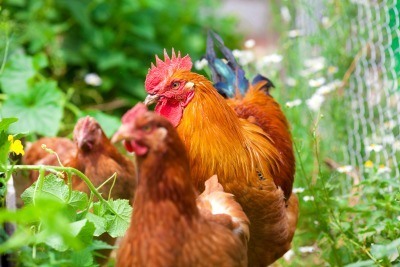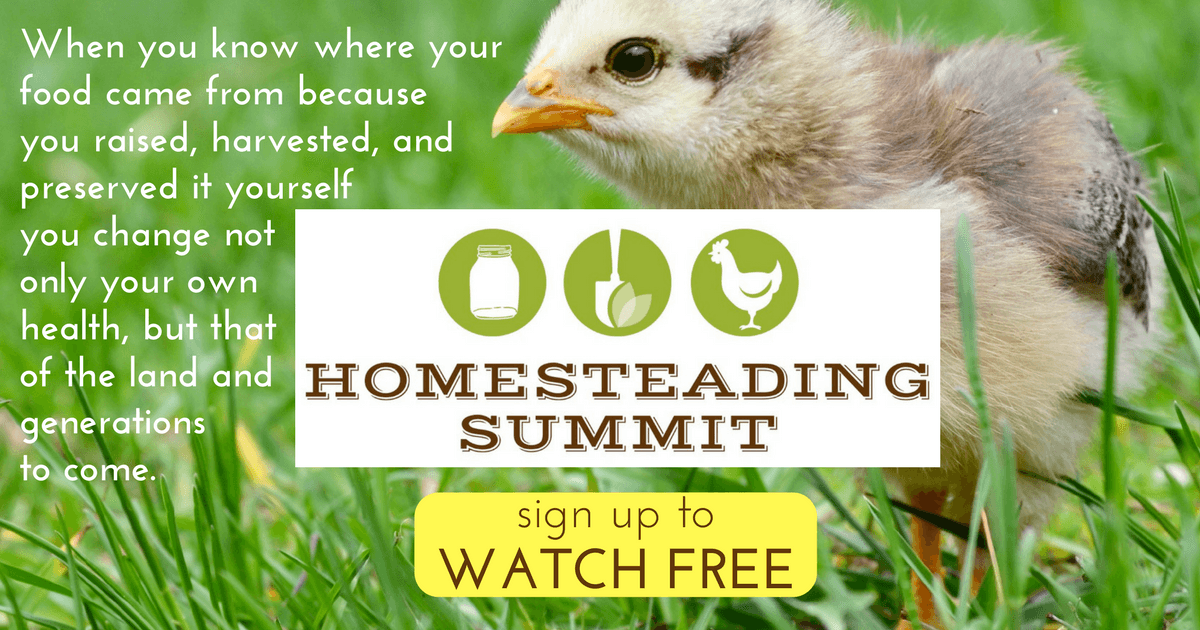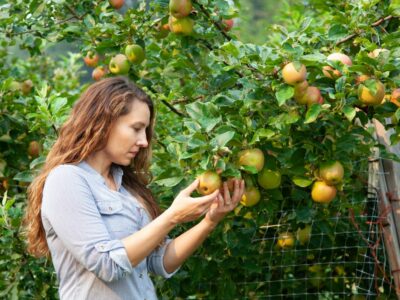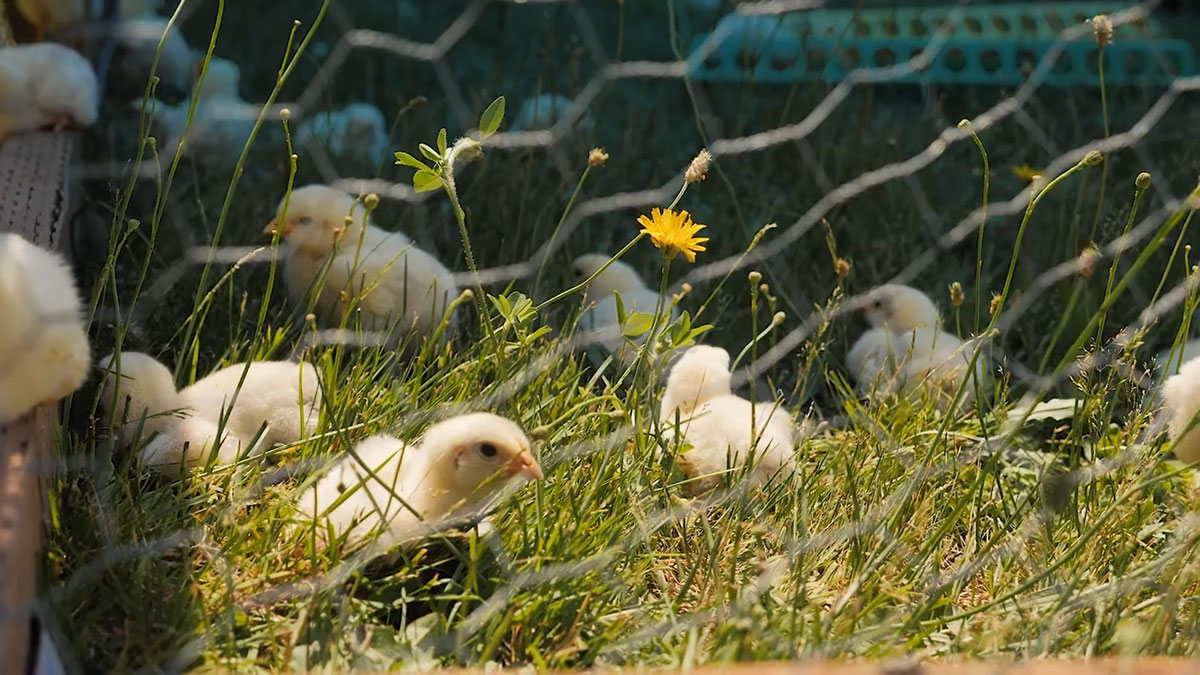Using chickens in the garden – 13 things you need to know first, to save you and your chickens a lot of heartache and frustration. Our goal is to use our crops and animals as a compliment to one another.
But if you've ever dealt with free ranging chickens and having your crops or plants destroyed, you know it's not as easy as it seems. Today I'm interviewing Lisa Steel from Fresh Eggs Daily for tips to keep your chickens safe when they're free ranging, but also how to get the maximum benefit from the chickens in your garden, while still getting to eat your vegetables yourself.
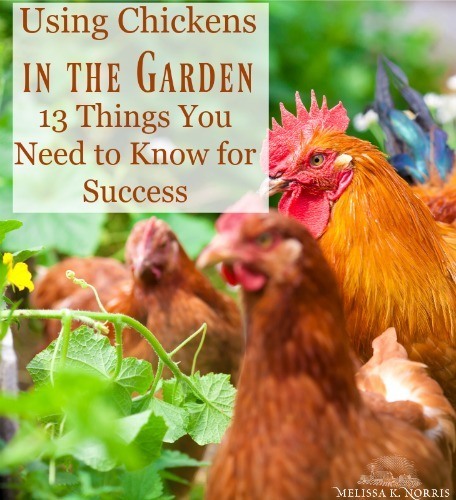
Listen below to Episode #139 of the Pioneering Today Podcast,where we teach families how to grow, preserve and cook their own food using old-fashioned skill sets and wisdom to create a natural self-sufficient home, with, or without, the homestead.
MKN: That we love with homestead and raising our animals is most people who are raising livestock or chickens for daily eggs, we're also gardening and we're wanting to make sure that we're using organic and natural methods in all area of our homes and our gardens, and we're raising our own food. So, using chickens, not just for their eggs and for the fun of having the flock, but also using them on your land and in your garden to making everything come full circle and to compliment one another. You have a book on this don't you?
Lisa: I wrote Gardening With Chickens –> snag your copy here. It came out last year. Like you said, it was kind of the result of years of failures, and the chickens just roaming around, kind of willy-nilly, and eating everything.
And finally, I got annoyed because I wanted them to roam around, and eat bugs, and fertilize our lawn and everything, but I also wanted to grow a garden. And fencing is expensive.
I thought, “There has to be a way that we can all just kind of live in harmony.” So, I started trying different things, and through trial and error, I came up with a system that worked.
I decided that I needed to write a book about it, so everybody could incorporate it into their chicken keeping, and trying to also encourage more gardeners to start raising chickens, and more chicken keepers to start gardening, because they do go hand-in-hand, like you said.
When Free-Ranging the Chickens Doesn't Work
MKN: When I did have my chickens free ranging, they loved to burrow in to my raspberries. And they exposed all of the roots and almost killed them.
They didn't bother my blueberries or my other fruit trees. They really just liked the root system of the raspberries. And they didn't eat the raspberries either, which was quite interesting.
Chickens don't discern on what they're allowed to get into and what they aren't, they get into it all.
Coyote chasing homesteader
MKN: We decided that we were going to have the chickens just completely free range and then they just go in the coop at night, which worked okay for a short period of time. One, we're very, very rural, so even during the day, we will have coyotes, and we have eagles, and hawks, and different predators.
I was putting clothes out on the line, with our chickens right across the fence. It was about 10:00 in the morning, I was putting clothes out on the line, and I look over, and there is coyote in between me and my chickens, who are free ranging.
I just start running at this coyote, yelling at it to get away. And this coyote just sits there, maybe in shock, that someone's coming at it and yelling. But it just stood there and stared at me.
I was in full mama mode. And I got within about literally 10 feet of the coyote before it finally turned tail and ran. I don't know what I would've done if I had gone all the way up to it and it wouldn't have ran. I didn't have anything in my hands.
The coyote did finally turn tail and run, but that's when I realized that even with me home during the day, that the chickens needed a little bit more protection. So, we started using a chicken tractor and doing some chicken runs with electric fence netting.
Best tips and overall strategy on how to keep chickens and crops safe.
Lisa: Good point about the predators.
- Don't let chickens out of their run until the afternoon. It seems like in the morning the predators are more active. Everyone's hungry, they're looking for their food, you see a lot more hawks. And then by afternoon, it seems like everybody's had their meal for the day and they move on. So, trying just in the afternoon to free range them I find works a lot better. Plus, then they put themselves to bed in the coop at dusk, so you don't have to worry about rounding them up or anything. So, that's one strategy that worked.
It also kind of minimizes the time that they're out roaming around and finding your garden and your plants and stuff.
2. Put something around the base of plants you don't want them to dig or scratch into and damage the roots. For the raspberries, what you want to do is put something around the root. Around the base of the plants. Chickens love to scratch up roots, chickens tilling garden is a great benefit when it's where you want them to till. I think that's where worms and stuff hang out, so they really go for the roots of your plants, and shrubs and bushes.
Use bricks, or pavers, or large stones, or just something around the root system, that'll really protect any bushes that you really don't want them to till, because they will, like you said. They'll literally dig up shrubs on you and just kill them.
MKN: Basically, putting up some type of barrier is going to be the best bet for keeping them out of the roots of your perennial bushes and plants.
Lisa: Right.
3. Use Netting. Bird netting can help, too, though, obviously, because that helps against the wild birds, too. And chickens will eat blueberries and raspberries. I guess they were too busy with the roots, but they will eat your berries too, usually.
Will chickens eat my vegetable garden?
Lisa: No, not in the summer garden. Well, first of all, our vegetable garden is fenced off. I planted it inside … It's almost like a chain link dog kennel kind of thing. And that's mostly to keep the wild birds, the raccoons …
We have a lot of things that like to eat our garden. So, that keeps everybody out. But I will use the chickens in the spring and the fall.
Benefits of using chickens in the garden during the fall
- They'll clean up anything that's leftover, they'll eat a lot of the leaves, your sweet potatoes, or like you said, your strawberries, or anything that you haven't picked, or you've left because it's full of bugs or whatever.
- They'll also start churning the soil over, so they'll get some of that stocky leftover into the soil where it can decompose over the winter.
- Plus, as they walk around, they poop. So they're fertilizing the soil as well
I like to use them in the fall cleanup, and then in the spring before you plant your crops … When you're in there just kind of getting rid of any rocks that might've gotten pushed up to the surface or pulling weeds.
They are wonderful. They'll eat any bugs that over winter … They'll eat bug larva, they will help you with weed seeds. Again, they kind of till the soil. Like you talked about, getting away from using a rototiller. And some people don't want to do that because it's not really great for soil structure.
But the chickens are a lot easier on the soil. They just kind of turn over the top few inches for you, loosen the soil, and like I said, get rid of the weeds, seeds, and bugs, and things, which is pretty nice.
They're good little off season garden helpers. And then I keep them out of the garden during the growing season.
Using Chickens in the Spring Garden
In the springtime when you put them in, do you have a time period where you do it so many days before you actually plant with bacteria or high levels of nitrogen?
Or is it because there's a relatively small amount because the chickens aren't in there. You're not shoveling wheelbarrow fulls on the garden.
Do you have any issues at all with too much nitrogen?
Lisa: No, it's been fine. That's a really good point on using any animal manure. There's also pathogens you have to worry about. E.Coli, salmonella, things like that. You should not use fresh manure on your garden.
When they're in the garden in the spring, like you said, it's such a minuscule amount to really be concerned. You could go afterwards and rake up after them, but I don't really worry.
You're planting your seeds at that point. You're not letting them in an active garden. So, even by the time your plants start to come up, the nitrogen is going to have dissipated a little bit.
In the fall though, when I cleaned my coop out after the summer, all the straw, chicken feathers, chicken manure goes right over the garden as mulch, so it keeps the weeds down. And then that has the entire winter to let it just sit there, and by the spring, then, those levels … Because there's a lot more manure in that than there would be in just a few random chickens roaming around the garden.
MKN: That's the method that we use, too, is in the fall, that's when I try to put all of the manure and mulch, whatever I'm using from the pens, and from the cattle, and cleaning up different areas of the yard and stuff, because it does work so wonderful. I feel like … When I do it, I'm like … It's almost like I'm getting free labor because all I'm doing is dumping everything on there, and then nature just takes its course and breaks it down for me over the winter months. If I can find a lazy route, I'm taking it!
Lisa: And that's what farmers and homesteaders have always done. It amazes me how many people ask me what to do with … A lot of people clean their runs, too, which … That's a little much. I don't do that. But a lot of people actually rake their runs out. And so, they have all this chicken manure, and they just throw it in the woods.
And I'm thinking, “Why not start a garden?” I mean, people pay good money for livestock manure and you've got it free and available. It really is wonderful.
We used to have horses, and we used the horse manure in the garden as well. If you worry about it, you could always compost it. You could go from the coop, or the pasture, whatever, to a compost pile, and then let that sit for six months to a year, and then start using it, if you are concerned about sanitary pathogens and all that, and the nitrogen.
Melissa: Yes, very true, because your compost pile, when done properly, is going to heat up hot enough. And you can put different thermometer probes and stuff in there if you're really concerned about it that will kill the harmful pathogens. And then you can put it on your garden.
Also is knowing how the animal the manure comes from is fed and cared for. Of course it's coming from our own livestock, and we only feed organic feed if we're feeding it. Our cattle is all grass fed. The chickens get scraps from the garden, and then when I'm supplementing with regular feed.
I make sure that it's all organic and certified non-GMO and that type of thing, because I also don't want manure from livestock that's been fed a lot of commercial feed that could have pesticides, and then putting that into my garden as well.
If using manure in an edible garden, apply 90 days before harvesting above ground crops and 120 days for root crops.
Lisa: And obviously you should always wash produce, even from your own garden. We wash things from the grocery store because you worry about maybe pesticide residue or other people at the store touching your stuff or whatever. You should really wash what you're picking out of your own garden as well, just to be safe, if you are using the homegrown manure fertilizer on it.
Are there any crops that you need to make sure that you keep the chickens away from because it could be harmful to them if they eat it?
Lisa: There are things that can be problematic for them. In general, most animals do know what's toxic and what's not, but you have the random animal who just eats a plant they shouldn't.
Your tomatoes, peppers, eggplants, white potatoes, those kind of things, they do contain toxins (the nightshade family) to chickens. I have tons of people tell me that their chickens have eaten an entire tomato plant and they've been fine, which is true. I mean, toxic does not mean immediately fatal, but if a chicken is sick, or weaker, or older, or younger, it could be that the toxins affect them differently.
Before I let the chickens in the garden in the fall, for example, I will pull out all the eggplant and tomato plants, and I just throw those in the woods. The chickens might eat them. They might. But there's so much else for them to eat, I just like to be cautious. I don't like to take chances on things like that.
I do feed them ripe tomatoes, which, still again, they do have a little toxin in them, but the chickens really love them. The ripened fruit has less toxin than the leaves and the stems. Just something to keep in mind. But that's about … The nightshade family is really the thing that can be the problem.
Oh, and rhubarb. Rhubarb leaves are toxic to people as well. Never done well with rhubarb, so I can't tell you if chickens will eat it or not. You might just want to keep the chickens out of the rhubarb patch.
Free Ranging Chickens for Bug Control
Melissa: YeHere in the spring time when it starts to get warm and you kind of have those first couple days where it's really hot out, we get those flying carpenter ants. Those big, huge black ants that will fly, and they will bite, and they just tend to almost invade everything the first few warm days of spring.
When my chickens were free ranging, I did not have any. They went hog wild, crazy on those things. I noticed a reduction in bugs in a good way on our homestead.
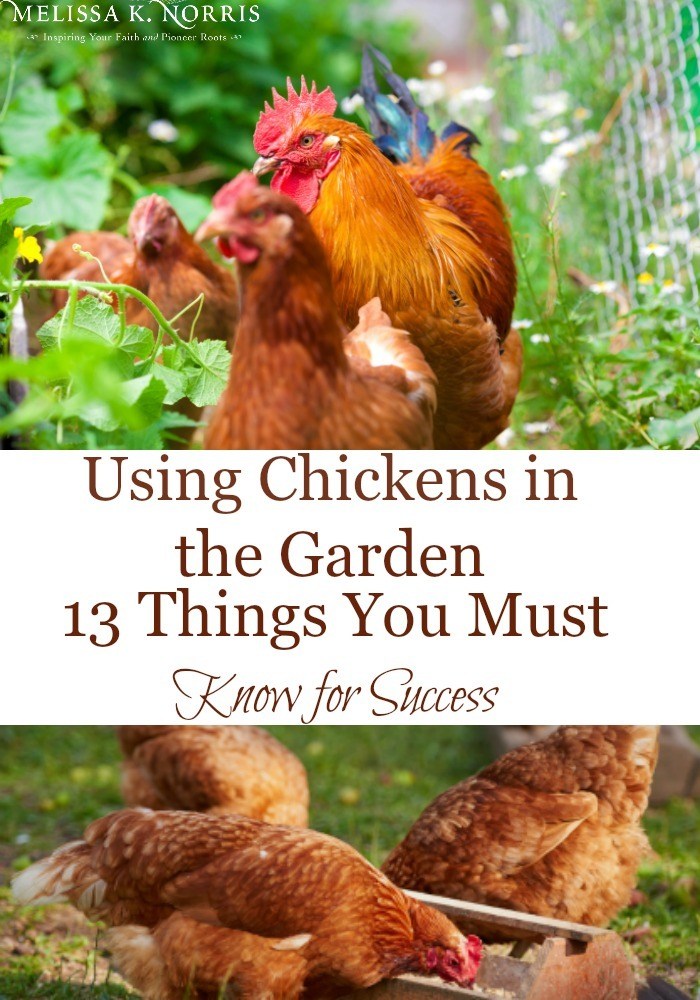
Lisa: Right. And, I mean, bugs. They are huge as far as bug control goes. For the ticks, and the mosquito larva. It's definitely beneficial to get them out in the lawn as much as you can.
How to train your dog with free ranging chickens
Melissa: We have a new puppy … Well, he's almost 10 months old now, and he goes out to feed with me, but I don't let him in the coop. He can see the chickens through the thing, but he doesn't get up next to them or anything like that.
When I go the free ranging mode, I want to make sure that they are kept safe because we do have a newer dog now.
Do you have any tips on training him to make sure that he keeps the chickens safe? That he's not a predator with the chickens himself? Do you have any tips for that?
Lisa: Yes, that's what we did when we got Bella. She was a baby German Shepherd. And we had had an older Shepherd when we first got our chickens, who was wonderful with them. And baby Bella was kind of a mess. She was running the fence, and she wanted to get at the chickens.
- Let them see the chickens while they're protected in a pen. We just let her spend a lot of time while they were penned up so she could see them and she could kind of get it out of her system.
- Put the dog on a leash near the free ranging chickens and practice obedience commands. And then when they were out free ranging, we would bring her out on the leash, and we would do a lot of, “Sit. Stay. No. Drop it. Leave it.” We made sure she knew the basic commands really, really well before we actually let her off the leash.
- Use a training collar after the dog responds to the leash obedience in the presence of the chickens. We got one of those zapper collars. And we actually put it on the pager so it would vibrate. When she was out, and the chickens were out, and she'd walk the leash, if she got fixated on them or she looked like she was going to do something, we would just zap her. And that was enough to break her concentration and get her back listening to us. Get her back into a “sit” or a “stay” or whatever.
Melissa: Okay. That is perfect because we do have one of those.
Lisa: Yeah. I get so nervous when people say, “Oh. Our dog would kill our chickens, so the dog is never out when the chickens are.” Well, that's great until somebody leaves the door open, or somebody doesn't realize the chickens are out, or the kids have friends over and they let the dog out.
Training them, it takes time. But like you said, then he could be out with them, guarding them. And dogs are smart. They learn really quickly. We have boundaries.
People think it's funny when their dog will chase their duck, and then the duck will chase the dog. We don't let our dogs chase them, ever. Touch them, ever. They're not allowed in the coop or the run. You have to set boundaries so the dog knows the rules. Once they know, then they're like, “Okay.”
Melissa: Okay. That's good. And I feel good because I've not let him come in. He's tried to come in the coop because he just wants to follow me everywhere, but I know I can't let him in and then tell him no and that type of thing. I feel like I'm on the beginning of the right path with him, so we'll just continue that training.
Psst– enjoy this interview. Make sure you're on my email list because Lisa is going to be a part of a very special Homesteading Event I'm hosting and planning (and practically bursting at the seams to share with you) coming very very soon.
What's been your experience using chickens in the garden?
- 5 Tips to Raising Backyard Chickens
- Integrating New Chicks into an Existing Flock
- Breeding Chickens Naturally: Selective Breeding for Eggs & Chicks
- Storing & Preserving Eggs – Farm Fresh Eggs Primer
- 10 Tips on Raising Chickens for Meat
- Butchering Meat Chickens
- Planning Your Livestock for a Year's Worth of Meat Per Person
- Your Livestock Questions Answered
